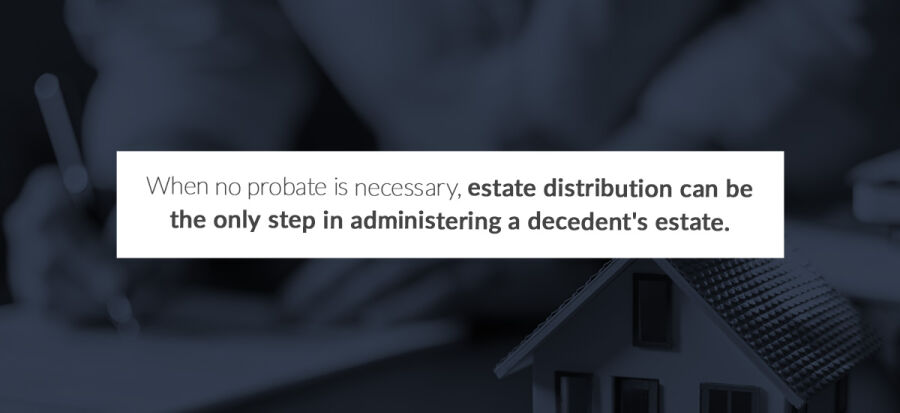When a loved one passes, ensuring their final wishes are carried out is often a complex process that involves the administration — and ultimate distribution — of their estate. Estate distribution is often the last step in following the decedent's instructions, regardless of whether formal estate administration is necessary.
The distribution step for physical assets involves managing the logistics of delivering items from the estate to the intended beneficiaries, which can be a time-consuming process. TSI can assist you and your family with an organized transport plan for all items included in an estate distribution.
What Is Estate Distribution?
Estate distribution is the process of arranging for a deceased person's assets to reach their intended recipients. The person in charge of distributing assets is called the administrator. They are usually an adult family member, close friend, or trusted attorney. If an administrator is named in the will, they are called the executor. However, if the decedent had a trust instead of a will, this person would be called a trustee.
After paying off all debts and taxes, the administrator must ensure all beneficiaries receive their assets. For accounts, this step means releasing the remaining funds in the accounts to the intended recipients according to the decedent's will or the probate rulings. For physical possessions, it means arranging for the decedent's belongings to be packed and shipped in a timely fashion.
Estate distribution might include manually transporting items to their new homes if beneficiaries are nearby, but it could also involve shipping those items across the country if needed.
The Difference Between Probate and Estate Distribution
It can be easy to confuse the two concepts since they often occur as part of the same process.
What Is Probate?
Probate is the general administration, overseen by the court, of a deceased person's will or the estate of a decedent without a will. Probate involves several steps, including:
- Determining the validity of the will, if there is a will
- Identifying and appraising the decedent's assets
- Paying income tax on income-generating properties or capital gains tax on sold properties
- Managing the division and distribution of assets
Legal requirements for probate vary from state to state, so it's important to get legal assistance — especially for large estates.
However, not all assets are subject to probate. For example, jointly owned assets and assets properly placed in a trust are generally non-probate assets. Non-probate assets can often have a more immediate distribution than assets subject to probate.
Estate Distribution vs. Probate
Estate distribution often refers to the final step in the probate process, which involves ensuring the intended beneficiaries receive their assets. However, estate distribution can also take place when no probate is necessary. The distinction is that probate is a multistep process that is only necessary for some estates, while estate distribution is the passing out of the decedent's assets whether or not probate was required.
The assets requiring distribution often include:
- Items titled solely in the decedent's name
- Items not payable upon death
- Tangible property in the decedent's possession
- Real estate

When no probate is necessary, estate distribution can be the only step in administering a decedent's estate. For example, anything jointly owned automatically transfers ownership to the recipient upon the decedent's passing, rendering probate unnecessary.
As with probate, the legal requirements for estate distribution vary based on location. If you are dealing with a particularly large estate, you will likely want to hire a legal professional for additional guidance.
3 Steps in Estate Distribution
Whether the estate requires probate or you can automatically transfer asset ownership, you will need to do a few things to finalize asset distribution formally.
- Distribute remaining assets: distribute assets to named beneficiaries per the deceased's specific instructions.
- Make decisions for unallocated assets: determine the distribution of remaining assets by assigning beneficiaries for each asset at your discretion or in partnership with the other beneficiaries.
- Retain paperwork: The administrator must retain copies of all relevant documents pertaining to the distributed assets for several years in case of future disputes. If there is more than one administrator, all administrators should have a copy of each account.
Common Estate Distribution Challenges
If you, a spouse, or a family member are the administrator of an estate, it's important to know the problems you may encounter during estate distribution, which can include:
- Multiple beneficiaries: The more people you need to distribute physical assets to, the longer it will take. Working with a professional estate moving company can simplify this process.
- Family disputes: If a loved one or other beneficiary contests another's claim to an item, you will likely experience delays. You may also face legal issues if an investigation reveals proof of fraud or abuse.
- Income tax: Estates are taxable entities. If any items in the estate generate income during administration, beneficiaries will likely receive less than anticipated due to tax requirements.
Importance of Professional Help and Estate Distribution Services
As you can see, the administrator or administrators of an estate have many responsibilities. Administrators are also legally and financially responsible for any errors made during estate distribution. This is why it's best to hire experienced professionals who can provide estate distribution services during this emotional time. To simplify the process, consider hiring a lawyer, accountant, appraiser, and logistics specialist.
Get Reliable Support for Distribution of Physical Estate Assets From TSI
As the administrator of an Estate, once the legal requirements have been satisfied you will need to facilitate the distribution of valuable antiques or sentimental items to beneficiaries in different locations, which can be challenging to track. You must consider safe and secure transport to ensure the items arrive without damage. Fortunately, you can rely on the support of experienced professionals to help you complete your estate distribution responsibilities.
At TSI, we'll work with you, your family members, and/or the estate administrators to create a customized moving and transportation plan. Whether all items are going to one place or need to be dispersed among multiple beneficiaries, our services can meet your requirements. In addition to moving and shipping services, we have professional organizers who can work in the home to clear out remaining items, make donation deliveries, and pack your items for safe delivery. This can be especially valuable if you are not local to the home and need someone to be onsite to take care of things.
We understand that estate distribution can be overwhelming, which is why we offer various services to give you the support you need and make the process as seamless as possible. Give us a call at 800-626-1257 to speak to a live agent, or request a quote online to see which estate shipping service is right for you.




